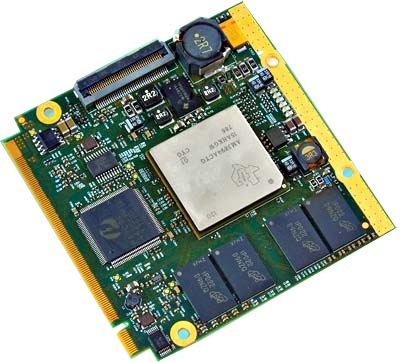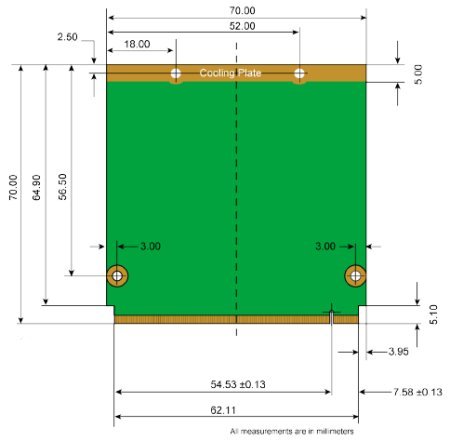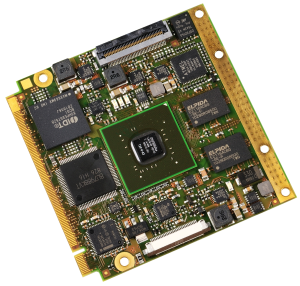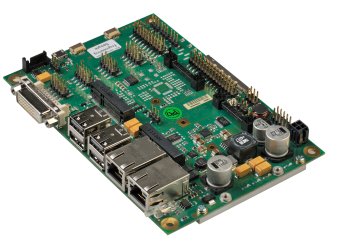Qseven module sports a TI ARM-plus-DSP chip
Jan 30, 2012 — by LinuxDevices Staff — from the LinuxDevices Archive — 7 viewsMSC Vertriebs announced a Qseven module powered by the Texas Instruments (TI) C6A8168 chip, which combines a 1.5GHz ARM Cortex-A8 core with a 1.5GHz digital signal processor (DSP). Designed for “demanding image processing” applications, the Q7-TI8168 includes 1GB of DDR3 memory, up to 8GB of flash storage, two SATA ports, six USB ports, and an HDMI/DVI interface, according to the company.
The new Q7-TI8168 is MSC Vertriebs' second Qseven module, as we review later in this story. The new product is said to be aimed at "demanding image processing functions in industrial automation, medicine, transportation and security systems."

MSC Vertriebs' Q7-TI8168
According to MSC Vertriebs, the Q7-TI8168 (above) gets its graphical chops from TI's TSM320C6A8168 Integra, which combines a 1.5GHz ARM Cortex-A8 core with a 1.5GHz digital signal processor (DSP). Also including a graphics accelerator based on Imagination Technologies' SGX530 IP, the TI chip supports dual HD displays and peripherals including PCIe, gigabit Ethernet, USB 2.0, and HDMI.
You'll find more information on the TSM320C6A8168, including a block diagram and spec table, in our detailed previous coverage (plus links to stories on some of TI's many other ARM-plus-DSP chips at the end of this story).
Regarding the Q7-TI8168 module itself, MSC hasn't yet posted a product page or data sheet, but the company's release offered the following additional specs:
- 1GB of DDR3 RAM
- up to 8GB of flash storage
- 2 x SATA ports
- SD/SDIO interface
- 1 x PCI Express channel
- 1 x gigabit Ethernet
- 1 x LVDS (up to 1920 x 1080 pixels)
- 1 x HDMI/DVI 1.3
- 5 x USB 2.0 hosts
- 1 x USB 2.0 client
- I2C
- SPI
- AC '97 audio
Background
Purchasers of COMs increasingly want them to come with ARM processors, not x86 — or so vendors seem to agree. Last September, for example, Kontron announced an ARM-focused module format, and Adlink said Dec. 8 it would use this to offer a range of sub-$100 COMs in 2012.
The Kontron/Adlink format (still un-named) will permit the creation of full-sized (82 x 80mm) or half-sized (82 x 50mm) modules, according to the company. Meanwhile, the existing Qseven format (below) bridges the size gap, measuring 70 x 70mm (2.75 x 2.75 inches) .

Qseven mechanical diagram
When it was originally devised, Qseven only supported x86 processors. However, the Qseven Consortium — founded by Congatec, MSC Vertriebs, and Seco, and now with many other members that do not, however, include Adlink or Kontron — added ARM support into the Qseven 1.2 spec as of September 2010. Subsequently, MSC released its Nvidia Tegra-based Qseven module, the MSC-Q7-NT2 (pictured below).

MSC's Q7-NT2
Qseven modules are, of course, entirely dependent on carrier boards to convey signals to and from the outside world. Last December, MSC released the Q7-MB-EP4 baseboard, pitching it as the ideal partner for the MSC-Q7-NT2. That board, pictured below, is now said to be compatible with the Q7-TI8168 as well.

MSC's Q7-MB-EP4
The Qseven module slot isn't visible in the picture above because it has been placed on the board's solder side, making it easier to thermally connect a heat spreader to a device's metal enclosure, MSC Vertriebs says.
Measuring 5.8 x 4.0 inches (148 x 102mm), the Q7-MB-EP4 has real-world ports on its coastline that consist of a DVI video output, four USB 2.0 ports, and two gigabit Ethernet ports (one of the latter is driven by an Intel 82547L controller on the board; the other is linked to a controller on the Qseven module). It also includes headers for an RS232 port, CANbus, LVDS video, and an optional 4/5-wire resistive touchscreen controller, MSC says.
According to MSC, the Q7-MB-EP4 also has an MMC/SD slot and an mSATA slot. Accepting 10~28VDC power, the board works in temperatures ranging from 32 to 140 deg. F, the company adds.
Further information
More information on MSC's Q7-MB-EP4 carrier board may be found on the Q7-MB-EP4 product page. Information on the Q7-TI8168 module hadn't been posted at the time of writing, but should become available from MSC's Qseven product page.
Jonathan Angel can be reached at [email protected] and followed at www.twitter.com/gadgetsense.
This article was originally published on LinuxDevices.com and has been donated to the open source community by QuinStreet Inc. Please visit LinuxToday.com for up-to-date news and articles about Linux and open source.